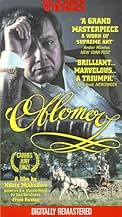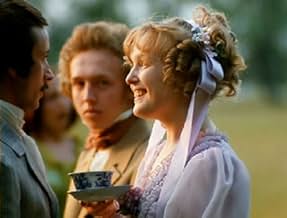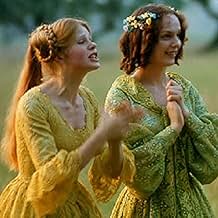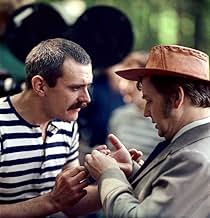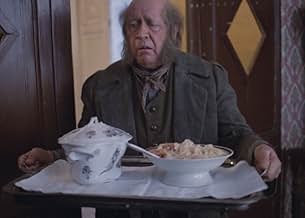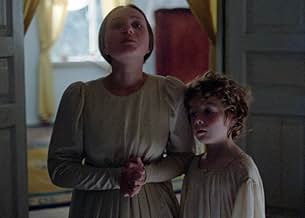Quelques jours de la vie d'Oblomov
Titre original : Neskolko dney iz zhizni I.I. Oblomova
NOTE IMDb
7,6/10
2,7 k
MA NOTE
Ajouter une intrigue dans votre langueSt. Petersburg, mid 19th century: the indolent, middle-aged Oblomov. He sleeps much of the day. His boyhood companion, Stoltz, now an energetic and successful businessman, adds Oblomov to hi... Tout lireSt. Petersburg, mid 19th century: the indolent, middle-aged Oblomov. He sleeps much of the day. His boyhood companion, Stoltz, now an energetic and successful businessman, adds Oblomov to his circle and introduces him to Olga.St. Petersburg, mid 19th century: the indolent, middle-aged Oblomov. He sleeps much of the day. His boyhood companion, Stoltz, now an energetic and successful businessman, adds Oblomov to his circle and introduces him to Olga.
- Réalisation
- Scénario
- Casting principal
- Récompenses
- 2 victoires et 2 nominations au total
Yelena Kleshchevskaya
- Katya
- (as Ye. Kleshchevskaya)
Galina Shostko
- Olga's aunt
- (as G. Shostko)
Gleb Strizhenov
- The Baron
- (as G. Strizhenov)
Evgeniy Steblov
- Oblomov's father
- (as Ye. Steblov)
Evgeniya Glushenko
- Oblomov's mother
- (as Ye. Glushenko)
Nikolai Pastukhov
- Stoltz's father
- (as N. Pastukhov)
Avis à la une
According to the Kino DVD, this film won the Cannes Jury Prize upon its release in 1979. Oleg Tabakov brings sensitivity to the title role- we actually feel sympathy for this lovable loser who has lead a rather unproductive life. He has worked in the past, but none of his dreams or goals (if he ever had any) have come to fruition. As the character develops, we discover that this isn't from laziness, but more that he's afraid to take any risks in life. The director, Nikita Mikhalkov, won the Oscar for Best Foreign film in '94 for Burnt By The Sun, but I think Oblomov is actually the better film, with the caveat that it is a little long. The films share a common theme of two men in love with the same woman. And he also returns to E.Artemyev for the musical score of the film (also includes Bellini's "Casta Diva" and music by Rachmaninov).
Oblomov and his best friend Stolz are so different in character that the film uses flashbacks to their upbringings to discover why. Stolz's relationship with his father is much more interesting than Oblomov's with his mother, and perhaps some editing here would help. The acting is great throughout, especially Oblomov's relationship with his servant Zakhar. The film has a couple of emotional climaxes, when Oblomov confesses his shame to Stolz in the sauna, and when he confesses his love for Olga on the gazebo. Olga's weeping at the end of the film suggests she has some regrets for past decisions. Oblomov's son running across the fields to visit his mother, well, someone else will have to elucidate that for me.
Oblomov and his best friend Stolz are so different in character that the film uses flashbacks to their upbringings to discover why. Stolz's relationship with his father is much more interesting than Oblomov's with his mother, and perhaps some editing here would help. The acting is great throughout, especially Oblomov's relationship with his servant Zakhar. The film has a couple of emotional climaxes, when Oblomov confesses his shame to Stolz in the sauna, and when he confesses his love for Olga on the gazebo. Olga's weeping at the end of the film suggests she has some regrets for past decisions. Oblomov's son running across the fields to visit his mother, well, someone else will have to elucidate that for me.
Ivan Goncharov's novel Oblomov is a classic of Russian literature and a true masterpiece. It's a sociocritical and philosophical work and it anticipates the formation of the Russian revolution by showing the apathy, phlegm and decadence of the impoverished Russian (landed)gentry at the end of 19th century. The main character Oblomov is a very lovable yet weak-willed and frail nobleman. He lives in St.Petersburg and lives off the income of his manor which is far away and run-down. For days Oblomov just stays in his bed, thinking and lamenting about all the things he should do but his lethargy prevents him from taking care of these problems. He reflects on hectic daily life and what is important, the meaning of life. His counterpart is his best friend Stolz, a German. Stolz is vibrant, fun-loving and burning for action and he tries to pull out Oblomov from his lethargy but it's a very hard task. One day Oblomov falls in love... The book was written in the tradition of new realism in Russian literature, like Tolstoi, Dostojewski or Turgenjew. The interpretation of the story varies a lot between then and nowadays and critics are still arguing what Goncharov's real intention was. Many people see the novel as a swan song on Russian class society and tsardom; and it is essentially a Fin de Siècle novel. Oblomov is like the representative of a class that has outlived itself, a dinosaur of Russian nobility. It's not a coincidence that Stolz is German, he's a symbol for the modernistic and educational ideas that came from the West at that time. I agree with this interpretation on the whole, looking at the novel in the context when it was written. The novel was published in 1858, that was only 3 years before the official abolition of serfdom trough Alexander I, the beginning of extended reforms which couldn't prevent the progression of the coming revolution as we know today. Lenin later spoke at a party convention about "Oblomovism" in reference of the overthrown system, threatening that the days of Oblomovism are over. You'll even find this term today in Russian thesaurus. The other interpretation is that today many celebrate Oblomov as an icon of refusal and idleness and point out the more philosophical aspects of the story. In the days of globalisation and people worshipping "shareholder value" and the mighty dollar, Oblomov can indeed be seen as the hero of all deniers. Many of his thoughts in the novel are universal and pose questions to us that are more up to date then ever before it seems. The movie captures the essence of the story in a great way and is free of any Soviet propaganda influence you might detect in similar films; it's very accurate to the original work and one of the best literature film versions I've ever seen. The cast is wonderful, the cinematography is top notch and fits the moods of the story perfectly, sometimes dreamy (in the great outdoor scenes), sometimes realistic. Oblomov's character comes over every bit as lovable, melancholic and pensive as he is portrayed in the book. The end is a little abrupt and an important part of the story is missing. That's a pity and the reason I give this film 8 instead of 10 points; I wonder if the director encountered some problems there or if their budget was cut short for any reason. Who knows. Check this movie out, it will be hard to find I guess but it's a great work and a refreshing change when one is only used to modern films. Of course this gem should be watched in cinema and I still hope that my local art cinema will someday organise a Nikita Mikhalkov retrospective so I get the chance to see it on the big screen.
One of the best films directed by Nikita Mikhalkov and one of the best adaptations of the works of the writer Ivan Goncharov. The magnificent trio of actors Oleg Tabakov, Yuri Bogatyrev and Elena Solovey as if immerses the viewer in the romantic atmosphere of a love triangle in Russia of the 19th century.
I tried to read Goncharov's novel while in high school after having polished off books by Dostoyevsky, Tolstoy, and others, but Oblomov defeated me in the first few pages. It was just real tough to get into a story about a middle-aged, semi-retired government clerk who doesn't want to get out of bed all day. Now that I am middle-aged myself, I can relate to Oblomov's condition more. I still thought the first part of the movie (of which he actually does spend a good portion in bed) was slow, but after seeing the rest, I regretted never having finished the book. This is one of the greatest movies ever in any language describing what it is like to be depressed - afraid to make decisions and without energy to carry them out, and then what the consequences are of failing to act. With the help of his best friend, Stoltz, and his slogan "now or never" Oblomov manages to get out of his St. Petersburg apartment and begins to rebuild his life. Stoltz even introduces him to a young lady friend, Olga, and (while claiming she is "just a child") tells Oblomov that she and her aunt care take care of him (by keeping Oblomov from crawling back into bed) while he (Stoltz) is off to England. By Part II of the movie, Oblomov has shed 30 pounds and apparently 20 years, and has moved to the country, next door to Olga and her aunt. At this point the movie deals with romantic love from the point of view of a very shy, somewhat older man for a vibrant young woman, and it is this bitter-sweet part that is most moving and interesting. This is one of Nikita Mikhalkov's Soviet-period films, and while it is set is Czarist days and almost fondly lingers on the details of the opulent houses of the upper class, it also slips in several (mostly tongue-in-cheek) comments and observations about the inequality between classes and the uselessness of the aristocracy. For example, Oblomov, from his bed, chides his servant for doing nothing all day long. The cinematography is gorgeous. When Oblomov lazes in the grass among the birch trees, you can almost smell the countryside. This movie is slow to get started, but rewards the viewer's patience greatly by the end. Highly recommended!
10katvyhh
Exquisite work.
Leaves you changed and moved.
Very respectful to the book and to the era, fantastic cast.
Le saviez-vous
- GaffesWhen Oblomov is writing his farewell letter to Olga, the candles are nearly blown out by the wind, but the light shed remains the same.
- ConnexionsFeatured in Oleg Tabakov. Smotryu na mir vlyublyonnymi glazami (2015)
Meilleurs choix
Connectez-vous pour évaluer et suivre la liste de favoris afin de recevoir des recommandations personnalisées
- How long is A Few Days from the Life of I.I. Oblomov?Alimenté par Alexa
Détails
Contribuer à cette page
Suggérer une modification ou ajouter du contenu manquant

Lacune principale
By what name was Quelques jours de la vie d'Oblomov (1980) officially released in India in English?
Répondre
